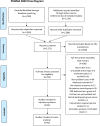The efficacy of Personalized Normative Feedback interventions across addictions: A systematic review and meta-analysis
- PMID: 33793583
- PMCID: PMC8016245
- DOI: 10.1371/journal.pone.0248262
The efficacy of Personalized Normative Feedback interventions across addictions: A systematic review and meta-analysis
Abstract
Personalized Normative Feedback (PNF) may help address addictive disorders. PNF highlights discrepancies between perceived and actual peer norms, juxtaposed against self-reported behavior. PNF can be self-directed and cost-efficient. Our study estimates the efficacy of PNF alone, and in combination with other self-directed interventions, to address frequency and symptom severity of hazardous alcohol use, problem gambling, illicit drug and tobacco use. We searched electronic databases, grey literature, and reference lists of included articles, for randomized controlled trials published in English (January 2000-August 2019). We assessed study quality using the Cochrane Risk of Bias tool. Thirty-four studies met inclusion criteria (k = 28 alcohol, k = 3 gambling, k = 3 cannabis, k = 0 tobacco). Thirty studies provided suitable data for meta-analyses. PNF alone, and with additional interventions, reduced short-term alcohol frequency and symptom severity. PNF with additional interventions reduced short-term gambling symptom severity. Effect sizes were small. PNF did not alter illicit drug use. Findings highlight the efficacy of PNF to address alcohol frequency and symptom severity. The limited number of studies suggest further research is needed to ascertain the efficacy of PNF for gambling and illicit drug use. Cost-effectiveness analyses are required to determine the scale of PNF needed to justify its use in various settings.
Conflict of interest statement
The 3-year declaration of interest statement of this research team is as follows: SR, SM and ND have received funding from multiple sources, including government departments in New Zealand and Australia. SR, SM and ND have also received funding from the International Center for Responsible Gaming (ICRG), a charitable organization, which derives its funding through contributions from multiple stakeholder groups (with funding decisions the responsibility of a scientific advisory board). ND is the recipient of a Deakin University Faculty of Health Mid-Career Fellowship. SM is the recipient of a New South Wales Office of Responsible Gambling Postdoctoral Fellowship and has formerly been the Victorian state representative (unpaid) on the NAGS Executive Committee. None of the authors have knowingly received research funding from the gambling, tobacco, or alcohol industries or any industry-sponsored organization. This does not alter our adherence to PLOS ONE policies on sharing data and materials.
Figures





References
-
- Gravely S, Giovino GA, Craig L, Commar A, D’Espaignet ET, Schotte K, et al. Implementation of key demand-reduction measures of the WHO Framework Convention on Tobacco Control and change in smoking prevalence in 126 countries: an association study. The Lancet Public Health. 2017;2(4):e166–e74. 10.1016/S2468-2667(17)30045-2 - DOI - PubMed
-
- WHO. Management of Substance Abuse: Screening and brief intervention for alcohol problems in primary health care. 2003.
-
- Reitsma MB, Fullman N, Ng M, Salama JS, Abajobir A, Abate KH, et al. Smoking prevalence and attributable disease burden in 195 countries and territories, 1990–2015: a systematic analysis from the Global Burden of Disease Study 2015. The Lancet. 2017;389(10082):1885–906. 10.1016/S0140-6736(17)30819-X - DOI - PMC - PubMed
-
- Global Burden of Disease Alcohol and Drug Use Collaborators. The global burden of disease attributable to alcohol and drug use in 195 countries and territories, 1990–2016: a systematic analysis for the Global Burden of Disease Study 2016. The lancet Psychiatry. 2018;5(12):987–1012. 10.1016/S2215-0366(18)30337-7 - DOI - PMC - PubMed
Publication types
MeSH terms
LinkOut - more resources
Full Text Sources
Other Literature Sources
Miscellaneous

